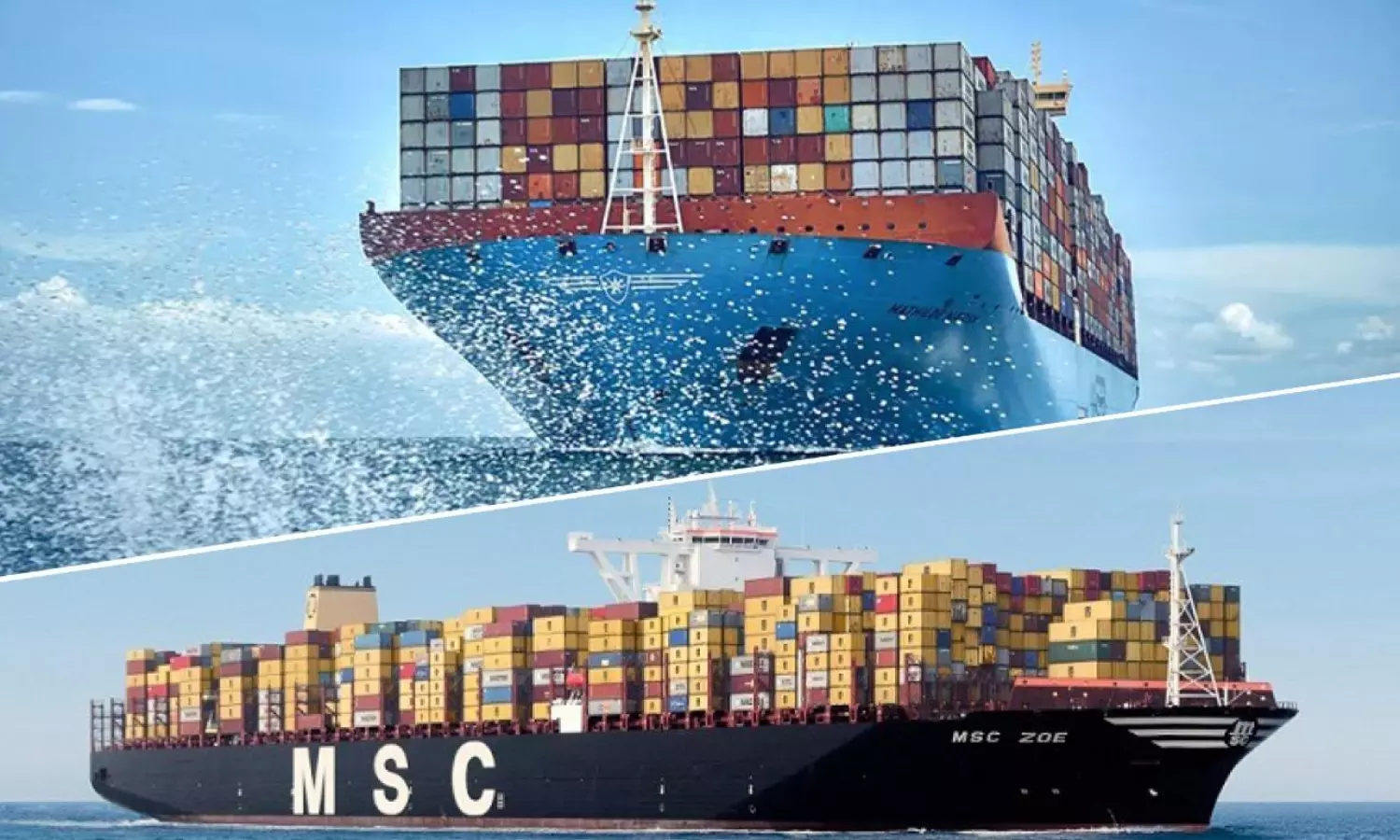2M split: Container shipping heading for turmoil
After controlling 35% capacity, the 2M alliance partners will now fight for market share and the same set of customers

Two titans of the container shipping industry - Maesrk and MSC - are parting ways!
In a joint statement, Maersk and MSC announced plans to end the 2M alliance by 2025. And with that over a decade dominance with market share of over 35 percent will come to an end. The following graphics explain the current scenario.
“MSC and Maersk recognise that much has changed since the two companies signed the 10-year agreement in 2015," says Vincent Clerc, CEO, Maersk and Soren Toft, CEO, MSC, in a joint statement. "Discontinuing the 2M alliance paves the way for both companies to continue to pursue their individual strategies.
"We have very much appreciated the partnership and look forward to a continued strong collaboration throughout the remainder of the agreement period. We remain fully committed to delivering on the 2M alliance’s services to customers of MSC and Maersk.”
"And here it is: The end of the 2M alliance," says Lars Jensen in his LinkedIn post. "My view is that this is only the beginning of a re-shaping of the alliance/vessel sharing agreement (VSA) constellations on especially the major east-west trades."
"I would expect the 2M alliance to have its final sailing in the coming year as both companies officially redefine their separate futures," says Peter Sand, Chief Analyst, Xeneta in his LinkedIn post. "Amidst the current headwinds in the container shipping market, offering the best product to all main haul East-West #shippers should be essential."
The container shipping market could be set to see a price war after Maersk and MSC announced the end of 2M, says S&P Global in its analysis.
Other alliances in the industry could come under pressure, the report added. "We could see a rate war like 10 years ago that could trigger a sharp drop in spot rates and could also lead to shake-ups in the remaining alliances."
Discontinuing the 2M alliance paves the way for Maersk to efficiently focus on its integrator strategy but with demand on most major trade lanes yet to see a sign of recovery, Ayush Verma, Senior Pricing Specialist, S&P Global says large-scale operators with big fleets could struggle to fill their vessels without alliance cargo commitments.
Beyond 2M, two other alliances control a significant share of the global container fleet -- THE alliance with Ocean Network Express (ONE), Hapag-Lloyd, HMM, and Yang Ming as members and the Ocean Alliance with CMA CGM, OOCL, Evergreen, and COSCO as members, the S&P report said.
"The fun starts now," the S&P report said, quoting a logistics manager for an Australian shipper.
Ms dominate
With global capacity of 26.5 million TEUs, MSC is the No 1 container shipping company with capacity of 4.6 million TEUs followed by Maersk (4.2 million TEUs), CMA CGM Group (3.4 million TEUs), COSCO Group (2.9 million TEUs) and Hapag-Lloyd (1.8 million TEUs).
MSC, again, had the maximum order book of 1.8 million TEUs followed by COSCO (884,272 TEUs) and CMA (660,746 TEUs) as on January 25, 2023.
Maersk reported a 37 percent increase in Q3 revenue to $22.8 billion compared to Q32021, "mainly due to an increase in ocean revenue of $4.9 billion. EBITDA increased to $10.9 billion." For the nine months ended September 30, 2022, Maersk revenue was $63.7 billion and EBITDA was $30.3 billion.
Naveen Prakash, Director, Global Logistics Solutions
"As the volumes are low and space supply is more, customers can negotiate better costs," says Naveen Prakash, Director, Global Logistics Solutions India. "Regarding service levels, Maersk will hold it but MSC won't change...so customers will choose automatically."
While vessel owners have already made their money, their options could be to let them idle or give it out at lower prices, Prakash added.
Kris Kosmala, Partner, Click and Connect
"I wouldn't read too much into this announcement," says Kris Kosmala, Partner, Click and Connect. "Coordination of sailings makes sense when multiple partners have complementary but not overlapping networks, and complementary but not overlapping types of assets. This is no longer the case of MSC and Maersk. Think about the airlines and you will see why United and Continental didn't make sense as two, it was easier to merge. In this case, the merger would never get approval, so they are going their own separate ways. The shippers will celebrate as it means they now have two options rather than one. All will be fine."
Your move, Maersk
The end of 2M throws up big questions for Maersk. Can it persist with its integrator strategy and at the same time maintain its liner connectivity? asks Drewry in its analysis of the plan.
"While a radical shake-up of the alliances might be a remote possibility, it is certainly on the table. Such an event could lead to carnage in the freight rates market as new members court shippers over to their new teams," writes Simon Heaney, Senior Manager, Container Research, Drewry.
The two companies have been on very different growth paths for some time, says Heaney. "MSC has been getting its tanks on the lawn by aggressively raiding the second-hand and charter markets as well as splurging on new orders. Maersk, on the hand, has focused on its vertical integration strategy and has not sought to defend its number one rank."
Maersk has invested so much money and effort into the integrator strategy that it is hard to see it backing down now. "The new CEO Vincent Clerc was around when that pathway was chosen so we don’t think his appointment heralds any shift."
One scenario could see Maersk muddle through with ad hoc vessel sharing and slot-swap agreements, and another is that they quickly ramp up their fleet size via the charter market, Drewry said.


